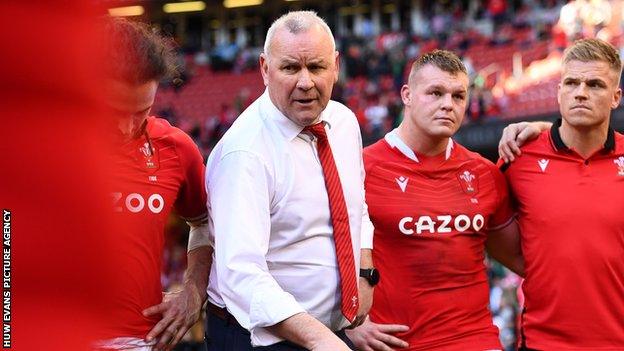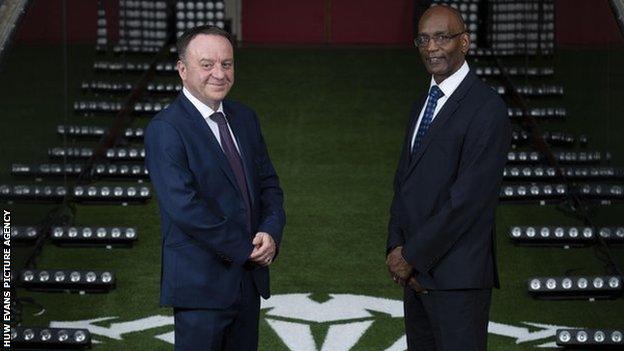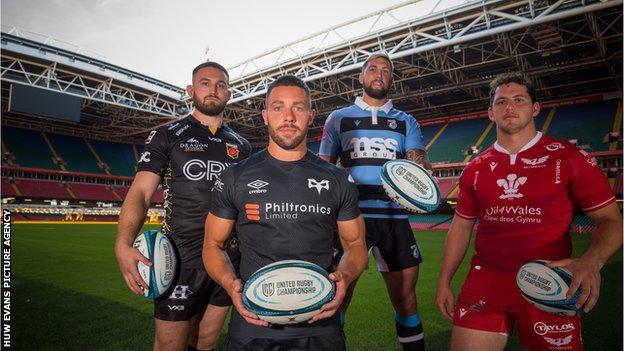Welsh rugby seeks remedy after nightmare season
- Published

Wayne Pivac and his Wales players after the shock Six Nations defeat to Italy
The curtain has fallen on a painful domestic season for Welsh rugby. Few will be upset by its passing.
This campaign ranks as one of the more traumatic in the turbulent history of this boom or bust rugby nation.
Wayne Pivac's Wales side finished fifth in the Six Nations, with only one win and a first home defeat to Italy, and now have the little matter of a three-Test trip to face world champions South Africa in July.
The success of the national team has often papered over the cracks of attempting to address the failing domestic game.
The four regions - Cardiff, Dragons, Ospreys and Scarlets - have continued to struggle, with no teams in the United Rugby Championship (URC) play-offs or European knockout stages.
The Welsh Rugby Union (WRU) has also faced allegations of sexism and misogyny from a former female employee that is scheduled to end in a tribunal later this year.
One of Warren Gatland's parting concerns when he left the Wales head coach job in 2019 now seems particularly pertinent.
"After what we've done and achieved, it would break my heart if Wales went back into the doldrums," said Gatland.
The New Zealander was talking after leading his side to the World Cup semi-finals in Japan.
During Gatland's 12-year tenure, Wales also won three Grand Slam titles and four Six Nations championships.
The doldrums is an apt term. Frustration now surrounds Welsh rugby and that could - worryingly - turn into apathy.
Let us make no bones about it, Welsh rugby is facing a crisis and things need to change. Quickly.
Focus on WRU leadership
Changes have to come from the top and that starts with the WRU, which governs the game in Wales.
The leadership of chief executive Steve Phillips and chairman Rob Butcher is under scrutiny.
Phillips used to be the WRU finance director, while Butcher is a former teacher who has risen through the community game ranks.

WRU chief executive Steve Phillips (L) and performance director Nigel Walker
Former Wales wing and Olympic hurdler Nigel Walker has been brought in as the new performance director and should emerge as a key figure in the organisation.
There are also structural issues that have been highlighted by former WRU chairman and Wales captain Gareth Davies, namely the role of community clubs in the running of the Union, especially if somebody wants to initiate change.
Davies highlighted the ability of around 30 clubs to call an extraordinary general meeting, 10% of the membership.
The critics point to this as meaning amateur clubs and officials are involved in the running of a professional organisation, emphasising the parochial nature of Welsh rugby in that community clubs can unduly influence the running of the professional game.
This system is nothing new. The WRU has always been a union of clubs.
The constitution needs to change to update the WRU into a 21st century, modernised organisation. But do turkeys vote for Christmas?
Wales woes with World Cup waiting
It was just over a year ago Wales were winning the Six Nations title under Pivac and were a minute away from achieving a Grand Slam.
Fast forward 12 months and they only managed one narrow victory against Scotland in the tournament, with that humiliating home defeat to Italy and a chastening opening loss in Ireland.
With the World Cup in France just under 16 months away, there are question marks over whether Pivac knows his best side or if he can make the right selection choices.
He has the opportunities, with the Springboks awaiting this summer before an autumn series which includes games against New Zealand, Australia and Argentina.
Wales' desire and belief is there - Siwan Lillicrap
The investment in the women's game and introduction of professional contracts has been one of the few positive stories for the WRU in the last 12 months, albeit after a traumatic period.
Twelve full-time contracts and 12 part-time retainer deals helped Wales to wins against Ireland and Scotland and a third-place Six Nations finish, their highest position since 2009.
That is an encouraging return ahead of the World Cup in New Zealand later this year, which will follow summer preparations in Canada.
There is more work to do, though, with a clear pathway needing to be created to bring through the next generation of players and ensure the move to full professionalism continues.
Regions flounder as cuts mooted
The issue of reducing the number of regions from four to three has made headlines this month. as the structure of the professional game is being scrutinised.
That recommendation was provided by an independent report commissioned for the Professional Rugby Board (PRB), the organisation responsible for running professional rugby in Wales.
That was known as the Oakwell Report and was a look into the "financial health of Welsh rugby".
No final decisions have been made but talk of losing a professional region has caused consternation and a few arguments.
As you would imagine, opinions vary. The founder of regional rugby, David Moffett, without irony, says it must be three club sides.
Pivac admitted he would not dismiss reducing the player base he has to choose from, by raising questions about whether Wales have the quality of players.
Legendary lock Alun Wyn Jones stated it "smacks of, reeks of, sorting out a balance sheet rather than improving the game".
The body charged with making the decision is the PRB. Created in 2017, it is made up of representatives from the four regions and the WRU and has a new independent chair in Malcolm Wall, who has replaced Amanda Blanc.
Whatever happens, there is a feeling across the board that change is required to stop mediocrity in the regional game.
A clean sweep of defeats for Welsh regions during the final weekend, especially Cardiff's 69-point embarrassing hammering in Benetton, is evidence of that.
There have been mitigating factors, with Cardiff and Scarlets stuck in South Africa towards the end of last year because of Covid-19 quarantine issues, although other clubs have endured similar problems.
No Welsh side finished in the top half of the URC to qualify for the league play-offs.

Players from four Welsh regions at the launch of the United Rugby Championship at the Principality Stadium
Ospreys received a trophy for finishing ninth in the URC, as they were named Welsh Shield winners for being the country's top region.
Not a league position that should be rewarded with silverware, in a revamped competition yet to completely capture the imagination of supporters in Wales.
The situation was not helped by sides not seeing their star players enough during the season.
The Ospreys, especially, have shown what is possible in the last few weeks of the season with access to a full side.
Allow X content?
This article contains content provided by X. We ask for your permission before anything is loaded, as they may be using cookies and other technologies. You may want to read X’s cookie policy, external and privacy policy, external before accepting. To view this content choose ‘accept and continue’.
Ospreys' 'success' means they are the only Welsh side to qualify for next season's Heineken Champions Cup.
In Europe this season no Welsh team managed a victory, and unsurprisingly no region qualified for the quarter-finals of either the Champions Cup or second tier Challenge Cup.
The regional record has not always been like this. Compare this to four Ospreys league titles, Cardiff winning two Challenge Cups and Scarlets lifting Pro12 silverware in 2017.
Regional success is currently a thing of the past but must somehow return in the future.
Financial issues continue
Money is not everything but it is important. Especially when you consider Wales are competing with the well-funded sides of Ireland and France, with a salary cap reduction coming into the English club game.
The regions and WRU have been at loggerheads about the funding model, an issue heightened by the effects of Covid-19. Details of the funding emerged in the Professional Rugby Agreement (PRA).
There have been a lot of figures thrown around for a WRU business that had a £90.5m turnover before Covid-19 and is expected to return to a similar level in the financial year ending 2022.
BBC Sport Wales asked the WRU to clarify some of those financial figures.
Former WRU chief executive David Moffett agrees with 'three-team' proposal
The WRU says around 74% of income predominantly arrived from staging international matches and commercial activities associated with the Wales men's team.
The projected pot for the regions of £26m for the 2020-21 season dropped to £3m during the pandemic, with a £10.8m Welsh government grant shared between the four regions.
The shortfall was mainly covered by a £20m loan, negotiated by the WRU for Cardiff, Scarlets, Dragons and Ospreys, but to be effectively paid back by the regions themselves.
The governing body says the current funding for regions for 2022 and 2023 is £23m and £23.5m respectively.
Questions have been asked about the money the WRU has received from private equity firm CVC Capital Partners for the Six Nations and URC.
The WRU says it will receive around £38m in increments between 2022 and 2026 from the Six Nations deal and points out that, in exchange, it is selling 14.3% of its revenue.
The Union says it plans to invest 12.5% of the CVC Six Nations money in rugby activities but claims the majority needs to be reinvested to "offset the dilution and preserve ongoing rugby investment".
With regards to CVC investment in the URC, the WRU says it will receive £28m between 2020 and 2024, which will be the final guaranteed payment.
It says the money is passed onto the regions and currently forms part of the annual PRA funding.
Hotel controversy and room for improvement
The WRU says Six Nations CVC money will need to be used to diversify and grow other incomes.
The new Parkgate Hotel on Westgate Street in Cardiff, which opened in October 2021, is an example of this.
Its development has often led to accusations the WRU is investing its money in this rather than the professional game.
The WRU claims it has "been able to generate a new income stream without leveraging its own balance sheet or utilising its own capital".
It says the funding of the hotel project was undertaken by Legal & General (L&G) with the money only being able to be used for this purpose.
Development needed at all levels
It is not just the upper echelons that are struggling. Wales' male Under-20s were in the final of the Junior World Championships nine years ago but have not experienced such heady heights since then, with some struggling seasons.
Welsh rugby's youth age limit reduced to under-18 to retain young male players
The need to split the community and professional games is something you will hear a lot from critics in Wales.
You have the WRU community board, who Pontypool RFC have called on to resign en masse twice in the last year over no promotion and not punishing sides for failing to fulfil fixtures.
The community game funding includes a ringfenced sum which the WRU says stands at £10.7m for 2022 and includes direct payments to community and Premiership clubs.
The Union says in 2022 the community game represents 12% of the organisation's turnover.
What has never been completely resolved is the role of the Premiership within the structure and how it should facilitate the professional game.
How many teams should there be? What is the league's purpose? Developing players for professional rugby or winning trophies for individual clubs? Those questions need answers.
Dale McIntosh: 'The Chief' airs concern over Welsh rugby's future
Is there a way forward?
The situation threatens not to improve in the short term.
The PRB meetings to discuss the future of professional rugby in Wales over the coming weeks are crucial to determine how the domestic game will be shaped.
While the talks are going on, Wales will be attempting to shock the Springboks with an unlikely - and never before achieved - Test victory in South Africa.
The new season starts in September with a return to normality following a couple of Covid-19 affected seasons, with the World Cup on the horizon in France next year.
What cannot be repeated are the events of the last 12 months. Welsh rugby finds itself at a crossroads and needs to take the right path.